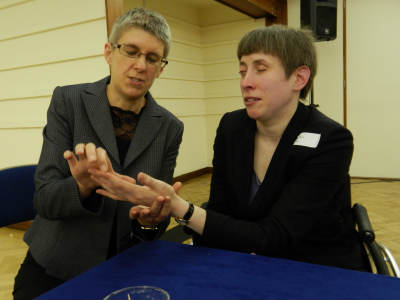
All of us will know or work with an older person who doesn’t see or hear very well. It is easy to assume that this is ‘part of getting older’ and that there is nothing much that can be done to support them. But this isn’t the case, and there is a raft of support out there for older people with sensory loss.
There are around 250,000 older people with dual sensory loss in the UK, and most are over the age of 65. Sight and hearing loss in older people (those who are 65-plus) can be overlooked in assessments, which instead focus on the physical needs of that individual without recognising the ways in which sensory loss can impact on all parts of a person’s life.
In our experience, older deafblind people are often seen by a social work team for older people, rather than a team which specialises in sensory impairment. Unfortunately older people’s teams can often be unfamiliar with the impact of dual sensory loss on an individual’s ability to carry out daily living tasks, and maintain social contacts.
Missed sight and hearing loss can lead to confusion, depression, falls, malnutrition and social isolation, which in turn will lead to an individual having higher support needs and a higher cost in the long run. It can also lead to poor social care provision for the individual. If care staff are visiting and are not aware that a person has sight and hearing loss, or do not know how to support an individual with these needs the visit can become difficult and traumatic for both the practitioner and the individual.
Local authorities have statutory responsibilities towards older people with combined hearing and vision loss. This is included in the guidance ‘Social Care for Deafblind Children and Adults’ LAC (DH) (2009)6.
They are required to provide specialist assessments, appropriate information and services designed to meet the needs of deafblind people, including older people. A specialist assessment must be carried out by someone who has been specifically trained in multi-sensory impairments, not just experts in ‘deafness’ or ‘blindness. It is the combination of the two that must be understood.
Putting things into practice
So how can social workers improve their practice in this area?
First, by acknowledging and understanding the prevalence and impact of dual sensory loss on older people. It is essential that those working with older people are alert to and have knowledge of the indicators of sights and hearing loss, its impact and where to refer. Local authorities should be providing training on this. There are also resources out there such as checklists for identifying sight and hearing loss and guides for how best to support people.
All social workers working with those over the age of 65 should be aware of sight and hearing loss and there are some simple signs to look out for. Struggling to read printed materials, having to sit very close to the television and using a very bright or low light can also be signs of sight loss. For hearing loss, not hearing the door bell, being unable to take part on conversations and preferring not to use the telephone can all be signs.
Once sight and hearing loss has been identified, people will often need a combination of ‘traditional’ social care services such as homecare, residential care and reablement, and specialist interventions such as mobility training and communicator guides. Some may just need the former and others the latter, but regardless of the service, it must be able to support people with sensory loss effectively.
Local authorities need to ensure that there is sufficient specialist support available to enable deafblind older people to live independently. If appropriate services are provided at the right time to someone with sight and hearing loss, then the need for greater health and social care provision at a later stage can be reduced.
Sue Brown is head of public policy and campaigns at deafblind charity Sense. For more information visit the Sense website.


 Bournemouth, Christchurch and Poole
Bournemouth, Christchurch and Poole  Hampshire County Council
Hampshire County Council  Lincolnshire County Council
Lincolnshire County Council  Norfolk County Council
Norfolk County Council  Northamptonshire Children’s Trust
Northamptonshire Children’s Trust  South Gloucestershire Council
South Gloucestershire Council  Wiltshire Council
Wiltshire Council  Wokingham Borough Council
Wokingham Borough Council  Children and young people with SEND are ‘valued and prioritised’ in Wiltshire, find inspectors
Children and young people with SEND are ‘valued and prioritised’ in Wiltshire, find inspectors  How specialist refugee teams benefit young people and social workers
How specialist refugee teams benefit young people and social workers  Podcast: returning to social work after becoming a first-time parent
Podcast: returning to social work after becoming a first-time parent  Podcast: would you work for an inadequate-rated service?
Podcast: would you work for an inadequate-rated service?  Family help: one local authority’s experience of the model
Family help: one local authority’s experience of the model  Workforce Insights – showcasing a selection of the sector’s top recruiters
Workforce Insights – showcasing a selection of the sector’s top recruiters 

 Facebook
Facebook X
X LinkedIn
LinkedIn Instagram
Instagram
Comments are closed.